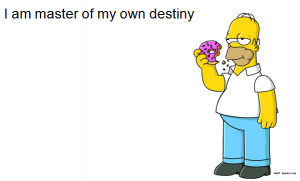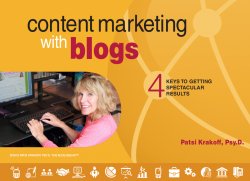Content marketing and the people who write marketing messages must understand how consumers’ brains work if they want to engage and create trust and loyalty. The problem lies in assuming people are in charge of their own choices…
 Everybody thinks they are in control of their behaviors and decisions. We think we are rational, logical, and smart human beings. But we may not be so smart if we don’t recognize our own and others’ irrationality.
Everybody thinks they are in control of their behaviors and decisions. We think we are rational, logical, and smart human beings. But we may not be so smart if we don’t recognize our own and others’ irrationality.
Our behavior and decision-making is affected, 95% of the time, by the unconscious processing in the mid and old brains. 95% of our decision making and buying and Web actions are heavily influenced by unconscious processing.
85% of the time our brains are on autopilot. But marketers continue to write messages as if people were paying attention.
Market research: in 2005 corporations spent more than $7.3 billion in US alone. In 2007, $12 billion. That doesn’t include marketing, advertising, etc. which carries an additional annual $117 billion tag. Most of it is spent in the wrong places and fails.
Companies and brands are gathering the wrong information, because consumer surveys and focus groups can only report back what they consciously experience …and it’s falsified by biases and flaws. The only true market research comes from monitoring brains of consumers as they react to messages, through neuromarketing.
8 out of 10 new product launches fail. Could it be that we’ve misunderstood how to capture attention, emotions and be memorable to consumers? Could it be we assume people are conscious and rational?
Health warnings on cigarette labels actually trigger smoking behaviors, they don’t deter any smoking at all, quite the contrary. How do we know? Not because smokers report they ignore the warnings. They all say they read them and believe them and want to quit smoking. But their brain scans show they actually want a cigarette even more. (Buyology, Martin Lindstrom)
We’re only aware of our logical thinking, and partially aware of our emotions. And even though our decisions are filtered through all parts of the brain, including our thinking brain, we are heavily influenced by instincts and unconscious triggers.
The reality is that what we decide to read, the website we pick, what we decide to do while there, and whether we buy or not are decisions and actions that we make largely with our unconscious brains, completely out of our awareness.
Wilson (2002) Unconscious: “…mental processes that are inaccessible to the conscious mind, but influence judgments, feelings or behavior…shortcuts that size up our environment, interpret and initiate behavior quickly.”
Our five senses are processing 11 million pieces of info per second. Of these only 40 enter our conscious awareness. (Timothy Wilson, Strangers to Ourselves)
Our unconscious mind lets us process all the incoming data from the environment and instantly decide if it’s good or bad, something to avoid, or something to explore.
It’s a hugely efficient short cut tool, showing us what we need to pay attention to with our conscious mind.
The brain uses up 20% of our energy supplies of glucose. So it will try to conserve energy by processing as much as it can subconsciously without having to think.
The unconscious mind is actually smarter and faster than the conscious mind.
The brain doesn’t like to have to think. It’s too expensive, burns up too much precious glucose energy stores. So if we can think without thinking, and stay on autopilot, we will. Here’s what neuromarketing studies are telling us (The Buying Brain, A.K. Pradeep):
The brain is frustrated by:
- Tasks that take too long to resolve
- Clutter
- Messages that distract or don’t apply
- The brain will ignore everything that it can…
The Take-Aways for Content Marketers:
- Address what’s-in-it-for-readers up front
- Get to the point right away
- Don’t explain too much background
- Tell stories of real people
- Add images, especially faces of people with eye contact
- Format with plenty of white spaces between lines, short sentences, short paragraphs
- Use bullet points














Recent Comments